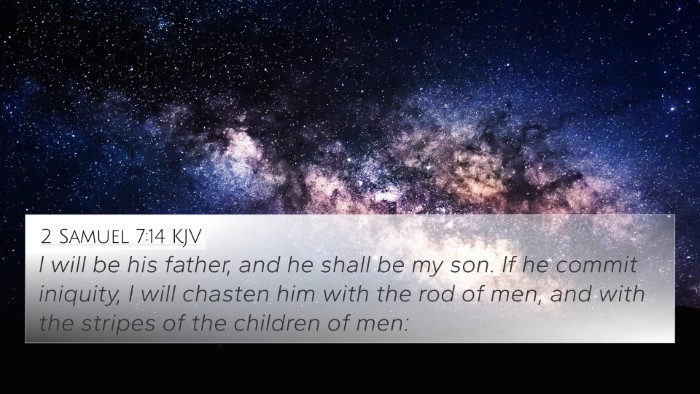Understanding 1 Chronicles 17:13
Verse: 1 Chronicles 17:13 (KJV) - "I will be his father, and he shall be my son: and I will not take my mercy away from him, as I took it from him that was before thee."
Summary of Meaning
This verse encapsulates God's promise to David concerning his son, Solomon, emphasizing the father-son relationship and the assured mercy that God will extend to Solomon. It highlights the unwavering nature of God's covenant and love, contrasting it with his previous actions regarding King Saul. In the broader context of Scripture, this verse serves as a foundational promise not only to David but to future generations, reaffirming God's fidelity to His chosen lineage.
Commentary Insights
-
Matthew Henry:
Henry notes that this declaration is a profound expression of divine favor and intimate relationship, suggesting that God's fatherly care is extended towards Solomon as a continuation of His covenant with David. He emphasizes the importance of obedience in the life of Solomon, foreshadowing the blessings that come from a faithful walk with God.
-
Albert Barnes:
Barnes remarks on the significance of God's promise not to withdraw His love and mercy, as He did with Saul. This contrast reinforces the stability of God’s selection of the Davidic line. The reference to 'mercy' highlights God’s grace, underscoring that divine favor depends on God’s choice and not human merit.
-
Adam Clarke:
Clarke describes the relational aspect of God as a father, emphasizing how this fatherhood is a source of security and strength for Solomon’s reign. He astutely reflects on the implications of divine mercy and its constancy when one is aligned with God’s will, contrasting with the fate of Saul who fell from grace due to disobedience.
Cross-References
This verse is deeply interwoven with various other scriptural passages that illuminate its themes of mercy, divine sonship, and the covenantal relationship. Below are key cross-references:
- 2 Samuel 7:14: "I will be his father, and he shall be my son..." - This passage reflects the same father-son relationship that God promises, furthering understanding of David's legacy.
- Psalm 89:27-29: "Also I will make him my firstborn..." - Elucidates God’s commitment to the Davidic line and promises of eternal kingship.
- Hebrews 1:5: "For unto which of the angels said he at any time, Thou art my Son, this day have I begotten thee?" - Relating to the messianic undertones and the fulfillment of sonship in Christ.
- 1 Kings 11:13: "Howbeit I will not rend away all the kingdom..." - The conditional nature of God’s promises to Israel and the Davidic reign.
- Romans 9:4: "Who are Israelites; to whom pertaineth the adoption, and the glory, and the covenants..." - The continuity of God's promises through the lineage of David, seen in the New Testament context.
- Luke 1:32-33: "He shall be great, and shall be called the Son of the Highest..." - The fulfillment of God’s promises in Jesus, connecting back to God’s covenant with David.
- John 14:13-14: "And whatsoever ye shall ask in my name, that will I do..." - Reflects the ongoing relationship between God and His children, mirroring the pledge made in Chronicles.
- Acts 2:30: "Therefore being a prophet, and knowing that God had sworn with an oath to him..." - Reiterates the importance of the promise made to David in the light of God’s faithfulness.
- Galatians 3:26: "For ye are all the children of God by faith in Christ Jesus." - Highlights the universal call to sonship for believers, echoing themes in 1 Chronicles.
- 2 Samuel 22:51: "He is the tower of salvation for His king..." - This reflects God’s sustenance and support for His chosen leaders throughout biblical history.
Thematic Connections
In analyzing 1 Chronicles 17:13, various themes emerge that connect both the Old and New Testament narratives:
- Divine Mercy: The ongoing nature of God’s mercy as reiterated in the Psalms and the prophetic literature.
- Father-Son Relationship: The theme of divine sonship that extends through both the lineage of David and believers in Christ.
- Covenantal Promises: The assurance of God’s promises remains steadfast, seen across the entirety of Scripture, from Genesis through the New Testament.
- The Role of Obedience: Solomon’s success and stability hinge on his faithfulness to God, a theme echoed throughout the lives of biblical figures.
- God's Sovereignty: The acknowledgment of God's ultimate authority in choosing His leaders and upholding His plans.
Tools for Cross-Referencing
To deepen understanding and explore the connections between these scriptures, various tools can assist:
- Bible Concordance: A useful resource to locate verses and words, enabling the discovery of related passages.
- Bible Cross-Reference System: Systems such as Thompson Chain or Ryrie Study Bible provide structured insights into thematic connections.
- Cross-Reference Bible Study Methods: Techniques that encourage systematic searching and linking of Bible verses.
- Bible Reference Resources: Online databases and physical reference works that compile cross-references for deeper study.
Conclusion
1 Chronicles 17:13 presents a profound promise from God, and through careful analysis and cross-referencing with scripture, one can glean rich insights into His character and plans. The enduring themes of mercy, relational integrity, and covenant fidelity resonate throughout both the Old and New Testaments, illustrating the richness of God’s word as applicable across all ages.

















